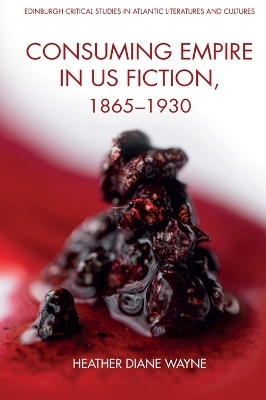
Consuming Empire in U.S. Fiction, 1865 1930
Seiten
2023
Edinburgh University Press (Verlag)
978-1-3995-0571-0 (ISBN)
Edinburgh University Press (Verlag)
978-1-3995-0571-0 (ISBN)
Traces authors' attitudes toward US economic expansionism through their fictional allusions to internationally-traded commodities
Pairs global economic histories with close readings of commodities depicted in fiction in order to shed new light on the strategies that both well-known and under-studied authors use to critique US economic expansionism at the turn of the twentieth century
Employs an interdisciplinary methodology informed by literary studies, global history, art history, economic history, postcolonial studies, and gender studies
Identifies affinities across literary chronologies, geographies, genres and fields through authors' common engagement with long international histories of commodity chains
Reframes literary debates about domesticity in a global context in order to reveal complex, varied and at times contradictory attitudes toward the intersection of gender and U.S. imperialism
Examines a variety of primary source materials, including novels, short stories, poetry, paintings, home decorating guides, women's magazines, children's geography books, trade reports, newspaper articles and journals
What is a reference to an Italian Egyptologist doing in Louisa May Alcott's portrait of domesticity Little Women? Why does Elizabeth Stuart Phelps's painter protagonist Avis Dobell know--and care--that her red shawl is dyed with desiccated beetles? Why might W.E.B. Du Bois's fictional sharecropper display a reproduction of a painting by William-Adolphe Bouguereau near his cotton field? These questions, and more, are answered by Consuming Empire in US Fiction, 1865-1930. An interdisciplinary study of references to internationally-traded commodities in US fiction, Consuming Empire in US Fiction, 1865-1930 assembles an integrated geopolitical analysis of Americans' material, gendered, and aesthetic experiences of empire at the turn of the twentieth century. Examining allusions to contested goods like cochineal, cotton, oranges, fur, gold, pearls, porcelain, and wheat, Consuming Empire in US Fiction, 1865-1930 reveals a linked global imagination among authors who were often directly or indirectly critical of US imperial ambitions. Furthermore, Consuming Empire in US Fiction, 1865-1930 considers the commodification of art itself, interpreting writers' allusions to paintings, sculptures, and artists as self-aware acknowledgments of their own complicity in global capitalism. As Consuming Empire in US Fiction, 1865-1930 demonstrates, literary texts have long trained consumers to imagine their relationship to the world through the things they own.
Pairs global economic histories with close readings of commodities depicted in fiction in order to shed new light on the strategies that both well-known and under-studied authors use to critique US economic expansionism at the turn of the twentieth century
Employs an interdisciplinary methodology informed by literary studies, global history, art history, economic history, postcolonial studies, and gender studies
Identifies affinities across literary chronologies, geographies, genres and fields through authors' common engagement with long international histories of commodity chains
Reframes literary debates about domesticity in a global context in order to reveal complex, varied and at times contradictory attitudes toward the intersection of gender and U.S. imperialism
Examines a variety of primary source materials, including novels, short stories, poetry, paintings, home decorating guides, women's magazines, children's geography books, trade reports, newspaper articles and journals
What is a reference to an Italian Egyptologist doing in Louisa May Alcott's portrait of domesticity Little Women? Why does Elizabeth Stuart Phelps's painter protagonist Avis Dobell know--and care--that her red shawl is dyed with desiccated beetles? Why might W.E.B. Du Bois's fictional sharecropper display a reproduction of a painting by William-Adolphe Bouguereau near his cotton field? These questions, and more, are answered by Consuming Empire in US Fiction, 1865-1930. An interdisciplinary study of references to internationally-traded commodities in US fiction, Consuming Empire in US Fiction, 1865-1930 assembles an integrated geopolitical analysis of Americans' material, gendered, and aesthetic experiences of empire at the turn of the twentieth century. Examining allusions to contested goods like cochineal, cotton, oranges, fur, gold, pearls, porcelain, and wheat, Consuming Empire in US Fiction, 1865-1930 reveals a linked global imagination among authors who were often directly or indirectly critical of US imperial ambitions. Furthermore, Consuming Empire in US Fiction, 1865-1930 considers the commodification of art itself, interpreting writers' allusions to paintings, sculptures, and artists as self-aware acknowledgments of their own complicity in global capitalism. As Consuming Empire in US Fiction, 1865-1930 demonstrates, literary texts have long trained consumers to imagine their relationship to the world through the things they own.
Heather Wayne is a teacher of English and independent researcher living in Massachusetts. She earned her Ph.D. from the University of Massachusetts Amherst, and she has taught writing and literature courses at UMass Amherst and the University of Central Florida. Her research focuses on nineteenth-century US literature, material culture, feminism, visual culture, empire and global history.
| Erscheinungsdatum | 04.04.2023 |
|---|---|
| Reihe/Serie | Edinburgh Critical Studies in Atlantic Literatures and Cultures |
| Verlagsort | Edinburgh |
| Sprache | englisch |
| Maße | 156 x 234 mm |
| Themenwelt | Geisteswissenschaften ► Sprach- / Literaturwissenschaft ► Anglistik / Amerikanistik |
| Geisteswissenschaften ► Sprach- / Literaturwissenschaft ► Literaturgeschichte | |
| Geisteswissenschaften ► Sprach- / Literaturwissenschaft ► Literaturwissenschaft | |
| ISBN-10 | 1-3995-0571-8 / 1399505718 |
| ISBN-13 | 978-1-3995-0571-0 / 9781399505710 |
| Zustand | Neuware |
| Haben Sie eine Frage zum Produkt? |
Mehr entdecken
aus dem Bereich
aus dem Bereich
Poetik eines sozialen Urteils
Buch | Hardcover (2023)
De Gruyter (Verlag)
CHF 83,90
Buch | Softcover (2024)
belleville (Verlag)
CHF 27,95


